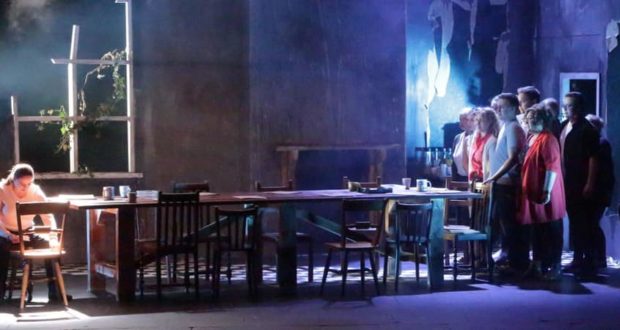A taut and entertaining exploration of the process of judging other peopleSummary
Rating
Excellent
Jason Schofield is on trial, accused of murdering his wife. He admits to having stabbed her seven times, but claims it was in self defence. Is he guilty of murder, or justifiable manslaughter? In this taut musical we never get to see either Schofield or the courtroom; instead, all the action takes place in the jury room.
The play opens at the end of the jury process. After over a week in deliberation they’ve been given twenty minutes to deliver their verdict, but it’s a 50:50 split between guilty and not guilty. How did they get to this impasse? To find out we wind back to the beginning, where the jurors introduce themselves in song. They’re a typically mixed group: a couple of stay-at-home mums, a builder, a university lecturer, a receptionist, a go-getting company director – just the sort of combination you’d expect in such a situation.
The songs, more Sondheim than Lloyd Webber, are spiky and urgent, with some cute touches: swearing the oath, for instance, is sung as if it were a school hymn, and ends “You simply can’t tell fact from fiction just by taking a vote”. The impossibility of knowing what really happened is at the core of this drama, summed up by the sung line “How can you sit with eleven other strangers, judging other strangers for their crime?” But the refrain ends: “You judge other strangers all the time.”
The first step is to choose the foreman, and several of the jurors are keen to promote their suitability for the role. “I run a business and control five hundred employees,” asserts the businessman, to which another juror declares: “It’s not about control, it’s about leading.” “Same thing,” replies the businessman.
As the story unfolds, we learn more about each juror and discover how their personal backgrounds affect the way they interpret the case. When the posh, assertive stay-at-home mum suggests role-play to reconstruct the crime, there follows a truly funny scene in which various jurors take the role of the defendant and his victim.
But who is the victim here? The murdered woman, or the husband who has been so frequently verbally abused – as evidenced by the trail of texts from his wife – that he is driven to commit the crime? As one juror points out, if the genders had been reversed they’d be applauding the woman for finally standing up to her abusive husband. The chorus of “Why do we treat men and women differently, when their actions are the same?” neatly sums up this thorny issue.
The uniformly strong cast are comfortable in their characters, both verbally and physically. The songs are perfectly performed, with not a bum note or a misplaced syllable in the solos, which are accompanied by other jurors as background choir, nor in the ensemble numbers. For twelve people to combine to sing clear, audible lyrics takes a serious amount of rehearsal.
The script, by Amy Fletcher, is tight and meaningful, tying together the revelatory threads with sensitivity and judgement. Music and lyrics are by Ashley M A Walsh, who also provides piano accompaniment. Joseph Meighan’s direction creates much movement of both actors and props in what would otherwise have been a static setting. Despite that, the play is somewhat claustrophobic; however, that then echoes the situation in which the characters find themselves.
The only note which doesn’t quite ring true is that the jury is all-white apart from one mixed-race man, but otherwise it’s a fine ensemble production, which raises serious issues in an entertaining way.
Written by: Amy Fletcher
Music Composed by: Ashley M A Walsh
Directed by: Joseph Meighan
Produced by: Anton Benson and Jess Ramsey
Booking until: 16 February 2020
Booking Link: https://upstairsatthegatehouse.cloudvenue.co.uk/thejury
 Everything Theatre Reviews, interviews and news for theatre lovers, London and beyond
Everything Theatre Reviews, interviews and news for theatre lovers, London and beyond



